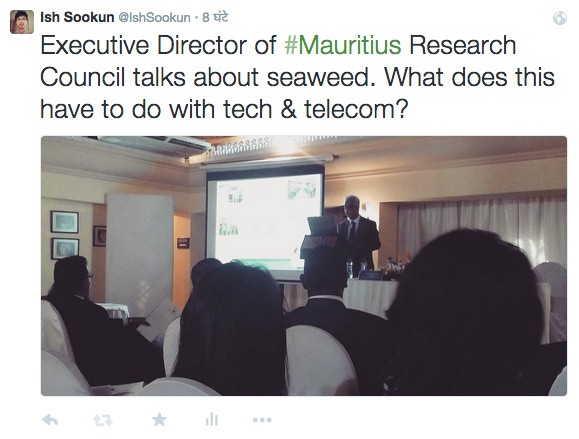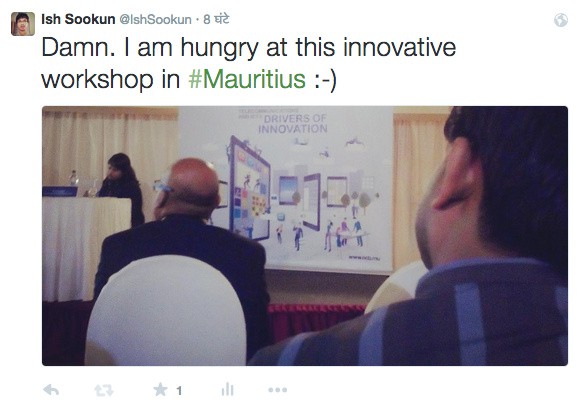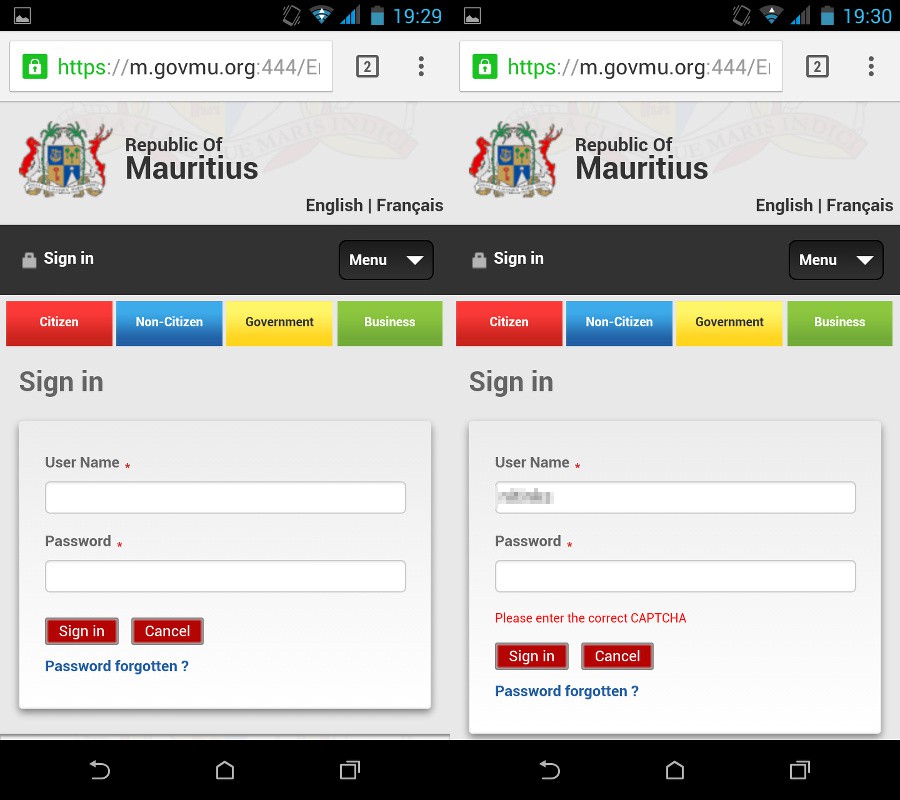I attended a workshop by the National Computer Board on the theme “Telecommunications and ICTs: Drivers of innovation”. I represented the Linux User Group of Mauritius. Though the workshop was scheduled to start at 09h30. I reached a little before nine. I signed the registration form, my name was properly written & clearly mentioned “Linux User Group of Mauritius”. That was good. I enquired if S. Moonesamy had arrived. They said no. SM was representing the Mauritius Internet Users.
The workshop was held at La Canelle, Domaine les Pailles. I went inside, found a cozy place and was going through the programme. Shortly after, SM arrived and we had the casual chit-chat if there was free WiFi available and all. I replied, no, I was using Orange Mobile Data. SM grinned saying attending a “telecom” event without free WiFi isn’t encouraging.
The Executive Director of the National Computer Board read the welcome address & then invited Mr. Biju Kadapurath of PricewaterhouseCoopers, one of the major sponsors, to address the audience. Mr Kadapurath gave a broad overview of the day’s topic about innovation and took a few examples of Smart Cities like that of the city of Barcelona, he mentioned the Clinic-in-a-Container project and the National Fiber Optic project that bridges the bandwidth gap suffered by remote places in India.
 The Minister of Technology, Communication and Innovation then opened the workshop after addressing the audience. The one thing that was a highlight during his speech was the emphasis he laid on Open Source Software and his mention of Ubuntu as an example. It didn’t go unnoticed.
The Minister of Technology, Communication and Innovation then opened the workshop after addressing the audience. The one thing that was a highlight during his speech was the emphasis he laid on Open Source Software and his mention of Ubuntu as an example. It didn’t go unnoticed.
After the tea break there was a presentation on Innovation in the knowledge economy by the Executive Director of the Mauritius Research Council. At some point I was bored with the prez and I tweeted about the relation between seaweed and telecom.

Then he mentioned about a National High-performance Computing (HPC) Center. I rose from my sleep and started paying attention. Yeah. That was interesting though I pondered why the Linux User Group of Mauritius hasn’t been made aware of the same. Oh… Oh… I reserved that for the question time. Indeed, as he finished his prez I shot my question. I briefly explained about the Linux User Group of Mauritius, showed my interest on this National HPC Center and I mentioned that there is an open source developer in Mauritius & what is the MRC doing to connect with the young bright minds of Mauritius. He explained that indeed the Mauritius Research Council should collaborate with user groups & make it easier for the bright minds to come forward with their ideas. He stressed that work should be done to connect the MRC with local talent. Then SM questioned about Intellectual Property Rights (IPR) saying that internationally it is used as a metric to measure innovation. The Director mentioned that there hasn’t been much IPR from the projects in Mauritius. SM was disappointed with the answer and proclaimed the Mauritius Research Council as a failure.
Then followed a presentation by Dr P.C Catherine from the University of Technology about an Ecosystem for Smart Cities in Sub Saharan Africa. By this time I was feeling hungry. Though I wanted to question Dr Catherine on his data & his conclusion about urbanization as I did not agree to compare rural Mauritius with rural Africa. For example, his conclusion about 200K people might move to urban regions in the coming years might not reflect in Mauritius. There is not much of a difference between the rural & urban in Mauritius based on accessibility of facilities within a few minutes drive in a car. Well, it’s not because FTTH is taking time to reach Providence that I am going to live in Quatre Bornes. There are many advantages attached to living in Providence than living in Quatre Bornes.
Mr. Biju Kadapurath made a comeback with his presentation on Driving innovation through Smart Cities. Oh, by this time, I was too hungry and nothing was getting inside my head.

At around noon we had lunch. Thank you NCB for the good vegetarian food :-)
I made some acquaintances during lunch and we discussed about 100Mbps local access. We looked at the different pictures to have such a local bandwidth. It could empower individuals to run applications & share resources over a localnet. User groups could chip in to set up cache servers and consequently decrease the load of international bandwidth when it comes to downloading huge files.
After lunch there was a prez by Dr Mahen Soobron from the Central Informatics Bureau. He explained about innovative Public Service with ICT. His slides went through the Government Web Portal and he talked about mobile apps. During the same time I was checking the mobile responsiveness of the Government Portal on my mobile phone. At the bottom of the page there is a “Pay Online” option. When I clicked on it, the same opened a blank page with a gov.mu URL.
However, my question was going to be about the Google “Terms of Service” that one has to accept when entering the captcha on the login page of the portal. Oops! When I tried logging on my mobile, there was no captcha displayed. I thought they removed it and showed the same to SM. However, when I entered my username & password it reported that I need to enter the captcha. WTF!

I made this remark during the question time, to which Dr Soobron replied that I could call the technical team and report such issues. Wait, it only suffice replying my emails when I send, I’d be happy :-) I can’t spend long minutes on a phone call explaining tech issues to non-tech people.
I took the above screenshots for this article when I came back home.
Anyway, after getting the “call tech team” answer to my first question, I thought it would be futile to beat around the bush explaining the issue of a Google “Terms of Service” and an “unfound” captcha. I rather asked him about the several un-used tools on the portal, namely the forum, blog and chat rooms. I wanted to know if any study was carried out prior to implementation to assess the need of implementing these. I also asked if there is data available from such studies and if the same could be made available so that enthusiasts and developers from the community could use the data and may provide a better alternative. The answer wasn’t up to my satisfaction. I didn’t argue further.
Next there was a presentation by Dr Saumtally from the Mauritius Sugar Industry Research Institute (MSIRI) and he presented some interesting work based on Geographic Information Systems (GIS). I did not comment on the same as the subject was outside my field.
The last presentation I attended was that of Mr Ben Mann from IBM UK. He went through 7 ways to boost innovation for a SMART Mauritius. I was eager to know these 7 ways. Well, he started by going to the basics of “innovation”, taking example of the famous lego blocks. The idea was to explain the audience about APIs and how they are changing the developer world. Well, changing? Hmm… Let’s say leveraging rather. He gave a quick intro of IBM Bluemix and Cloud Foundry. As he finished his prez I was first to question him about Bluemix. I already registered for the Bluemix trial some time back and noticed that Virtual Appliances are still in beta & not currently available. I am more interested in tweaking & deploying appliances rather than developing and writing code. I questioned about the engagement of IBM with regards to the latency that we Mauritians suffer. I tossed that Mauritius being far from the rest of the world, it takes much time for our requests to go to and fro the destinations such as Google Cloud, Amazon Web Services and Microsoft Azure. Coupled with concurrency issues this latency can at times be a headache for us. I wanted to know what does IBM have in its pipeline to tackle this issue. That’s when Ben mentioned the acquisition of Softlayer by IBM and a long term plan to geo-localize resources. He also mentioned the possibility of having local instances of Bluemix. That does sound interesting vis-à-vis competitors such as Microsoft Azure and AWS. Only time will reveal the tech specs & we’ll know the real thing that is in the IBM pipeline.
I enjoyed the workshop, engaging with people & getting acquaintances. Though for a successful workshop I’d rather expect more of the Question & Answer happening. We (SM and I) were not allowed to more questions and that somehow didn’t let me broaden the different aspects that could have been discussed and brainstormed today.
Nevertheless, as I said, I did enjoy meeting new people :-)